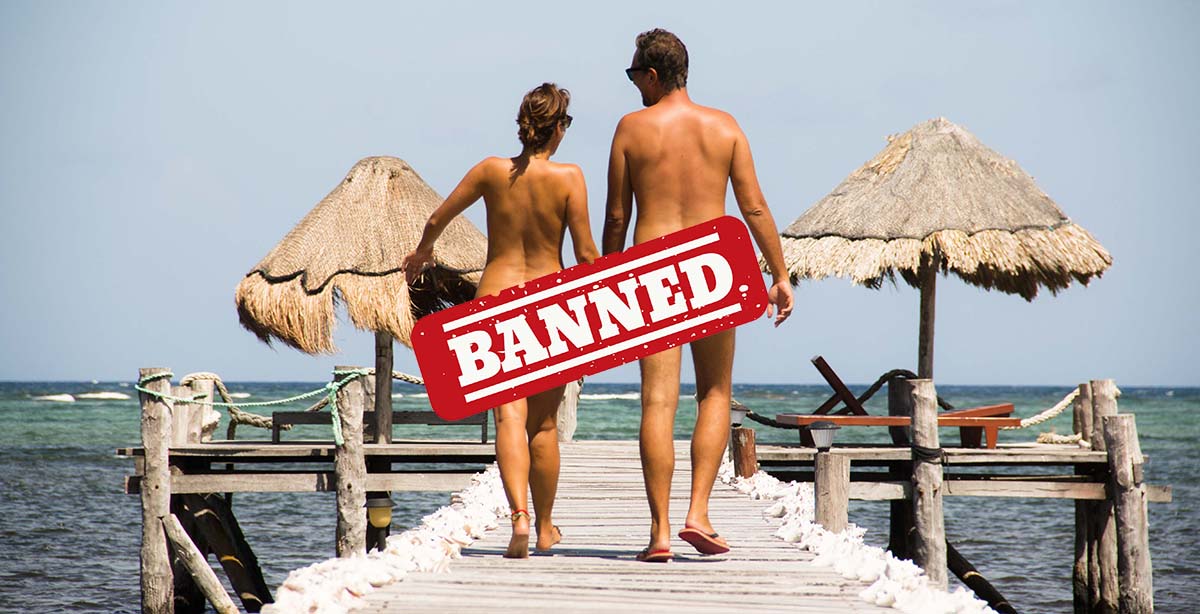If you’re a naturist content creator or just anyone who likes to share advice, experiences, or thoughts about naturism online, the terms “shadowbanning”, “Facebook jail”, “content removal”, and the most unfortunate one, “total ban”, probably make all the hairs on your body come straight up.
It’s an endless cat-and-mouse game in which we, the content creators try to adjust to the tight rules of social media (and maybe bend them here and there) and they, the platform owners, punish us for never being compliant enough.
Censorship on social media seems to come in waves, sometimes they leave us alone for months and just when we’re starting to feel relaxed, they reappear. Often because they made a tweak to their algorithms. For the last several months, it has been Meta’s hot breath that we’ve been feeling in our necks. On an almost daily basis, Facebook posts are being removed. Often several ones per day.
View this post on Instagram
This has to stop
We are not alone in this, every naturist content creator, naturist club, naturist resort, naturist federation, and individual naturist who shares this part of their lives on Facebook noticed the change. Yet another witch hunt had started. But this time, the community wouldn’t just suck it up.
The International Naturist Federation decided to react. They wrote an open letter to the directors of Meta, explaining what naturism is and why censorship of non-sexual nudity doesn’t just hurt our community but encourages mental health issues and negative body image on a worldwide scale. They demanded that this witch hunt would stop and that once and for all, the naked body would be seen as something natural, something human.
This letter, signed by organisations of over 30 countries, was simultaneously sent to the Meta offices, published on the INF-FNI website, and released to the press. Of course, we and everyone else were hoping that the media would pick it up. We could imagine a million catchy headlines: “Naked protest against Facebook”, “Will Facebook go nude?”, “Nude is not rude: Naturists challenge social media restrictions”. Every journalist knows that these articles will be read. But then something happened that nobody expected.
View this post on Instagram
Mark Zuckerberg announces less censorship
Barely hours after the INF letter must have arrived at the Meta offices, Mark Zuckerberg, inventor and face of Meta, made a rare appearance on Instagram, that other Meta platform. With a serious face he looked straight into the camera to say that Meta has become too strict, that their moderation is too harsh, and their censorship too strong.
For a split second, we thought “This can’t be true… Is he really replying?…”. He was not. It soon became obvious that the sudden change of direction was largely a political choice. But this doesn’t have to be a bad thing, right? In the end, it doesn’t matter if it was organised international naturism or the newly elected American president who pushed Meta in this direction. As long as the direction is beneficial for us. Well… that wasn’t exactly the case either.
View this post on Instagram
Meta’s new direction
Long story short, Mark Z announced that he would get rid of fact-checking. Very similar to what happened to Twitter the moment it became X. Under the concept of free speech, they will allow everyone to share their own opinion, even if it’s controversial or downright untrue. What to make from it will be up to the reader.
It’s important to understand that this is only about moderation of the narrative and that this doesn’t necessarily apply to the Community Standards. These say specifically that nudity is not allowed on the Meta platforms and Mark’s speech didn’t indicate that any changes to these standards should be expected. What this does mean is that now we should be allowed to talk freely about naturism, without visualising it. Which wasn’t always the case in the past.
But there’s a huge caveat. As there won’t be any fact-checking anymore, literally anything can freely be said about naturism. If someone now shares an article that claims that the whole concept of non-sexual social nudity is a hoax and that naturist resorts are in fact very sexual places, there won’t be anyone to double-check the truth. There won’t be a button that you can press to mark this statement as false. There won’t be anything to do about this.
It’s way too early to predict the actual consequences though and we don’t like to be negative about things we can’t know yet. What is certain is that the balance between this new concept of “free speech” on social media and the Community Standards will have to be tested and that this is likely to lead to even more confusion and inconsistencies in moderation.
View this post on Instagram
Who cares?
The timing of Mark Zuckerberg’s message wasn’t particularly beneficial for the open letter. Although we are certain that many journalists would have loved to write a piece about naturist protest, it just didn’t weigh up against a message from Meta’s big chief himself about how the way we have to interpret information is likely to change forever. That Zucks. (sorry, we really wanted to make this joke).
We are very aware that because we are content creators ourselves, our opinions can be very biased. So what we like to do in cases like this is have a look around and think about other people. When all of this was happening, we were at a naturist resort in the south of Spain. We went to the poolside bar and looked at the naturists around us. How much would they know about social media censorship? How many of them have been in Facebook jail? How many feel the need to share naturist content on social media?
The answer: Probably not that many. The everyday visitor of a naturist resort may consume content about naturism on social media but has little idea of the struggle to put it there. They might notice if eventually it disappears, but even then they’ll move to other places to find their information.
View this post on Instagram
United naturism finally unites
We may want to ask the question: Was it really worth it? Was it worth the time to organise this campaign, to write the letter, to review it, to talk about it, to tweak it, to sign it? Was it worth the stamps to send it all the way to Silicon Valley?
The answer: Very much. Sometimes it’s important to fight even when the odds are against you. The letter exists, it’s out there, on the internet and somewhere in California. Who knows who may read it in the future?
More importantly, never before have we seen organised naturism this united. One letter, signed by organisations of over 30 countries. Some organisations aren’t even part of the International Naturist Federation. One of them was a human rights organisation. Even if this letter doesn’t cause the smallest breach in the dam, organised naturism has proven that they can be one big front and this might be of huge benefit in the future.

Support Naked Wanderings
Do you like what we do for naturism and naturists?
Did we make you laugh or cry?
Did we help you find the information you were looking for?
Then definitely join our Patreon community!





Surely non sexual naked pictures are less harmful on social media than posts which aren’t fact checked? Just shows that society is controlled by a few large corporations who can forward their own views rather than that of the masses without concern for the damage they may do.
Keep up the fight to get naturism accepted by social media.
There is something to do about wrong information (about any subject). Respond to it with the right information. Freedom of speech, as with any freedom, requires participation from everyone. Meta’s censorship in the past has resulted in good, valid information being unjustly hidden to serve political purposes. That’s even more harmful than allowing bad information to be published where it can be responded to with good information.
We see that directly with nudism. When all information about nudism is suppressed (whether good or bad), it implies that nudism itself is bad (else why the suppression?) Dropping the censorship may allow bad information about nudism to be published, but it also allows the good information to get out. In the long run, which is which will be obvious.
Imo the information about nudism is not surpressed, good nor bad. We are discussing on the naturist blog afterall:)
The issue is with publishing graphical content that may potentially overlap with porn, regulated in most jurisdictions. Meta is not able and is probably not willing to spend their resources to check if a given image or video is compliant. The cheaper and more efficient solution is to ban everything that may be a potential risk.
A real solution would be to convince the global society not to look at simple nudity as something inherently sexual. Then laws and courts will follow and eventually Meta will. Catch 22 as Meta is an important device for shaping mass opinion.
It’s sad that the real world problems leaked so easily into virtual one.
For a long time, we shared the exact same opinion: That it’s all a matter of money.
We’re not conspiracy theorists at all, but the timing of all this happening is quite interesting. Minority groups that are not conform with the “model citizen” are easily being categorised as “woke” and are becoming a political target. Control over social media is today by far the best way to control the public opinion.
That’s very true!
The problem is that although the social media giants like to preach freedom of speech, they have control over which speech gets to be seen and which doesn’t. This was very clear on X during the American elections
You say “This has to stop” but it doesn’t “have to” at all. It might be nice if it would, but none of us has any way to change the big companies’ behavior. We could all quite using their services today, and they wouldn’t even notice. I realize that you’re trying to make a living by posting about naturism, and you have to go where you get the best audience, but that audience is found on channels which can make a profit without helping you at all.
If they’d been willing to be somewhat realistic, the naturist organizations could have said (but of course did not): “We recognize that replacing the automated systems with trained human moderators will cost money, and we expect you to absorb those costs.” Or perhaps that last phrase could have been “and we promise to pay those costs.”
Not that Zuckerberg would listen, either way, but at least the naturists could have shown that they’re willing to acknowledge that this translates into a question of money. The other thing that naturists could acknowledge is why there’s censorship on these channels in the first place, which is to keep the pornography out. I don’t think the social networks are our enemies when they do this, but to keep the costs down (and the profits up) they use crude tools which respond to nudity rather than sexual content.
So what’s the solution? I can only think we have to build our own house separate from theirs, and have our own controls on what’s allowed in it. But if we did that, I would predict that there would be people trying to include sexualized content, and the boundary between the permitted and the forbidden would always be subject to arguments, with moral accusations likely from both sides. And if any of this ends up costing money, there has to be a source of it. One hates to say “There’s no answer”, but maybe it’s the truth.
You make a lot of valid points here John!
It’s true that Mark Zuckerberg couldn’t care less about naturists, he may not even know that naturism exists. Even if we’re potentially talking about millions of people, it won’t weigh up against their 3 billion Facebook users. Many of whom may rather see no nudity on the platform.
Building our own platforms isn’t really helpful either because we’ll be taking huge steps back promotion-wise. And as you mention, the moderation is horrible. We’ve been moderator at a number of platforms in the past and we can tell you, there are a lot of strange people out there.
Personally, we think that the solution might be in trying to protect naturism in a legal way. Decades ago, naturist organisations have managed to get naturism legalised in designated spaces. In some countries, they even managed to get non-sexual public nudity out of the law in general. The next step might be to make it a human right or cultural inheritance.
Oops, when I said “We could all quite using their services” I obviously meant “We could all quit…”! I am quite sorry.
The naturist community is, unfortunately, not well organised or vocal. Maybe for fear or exposing ourselves as naturists, most post rarely have more than 5 comments or 10 likes.
It’s a fight worth fighting for, but unless we get louder, we will not be heard.
True!
Head to Bluesky. Problem solved in many ways.
We are on Bluesky, but if you want to get the word out you need the mainstream channels
Hi Chris. Is Bluesky uncensored? Or does it just have different censorship rules? Will they ban someone for disagreeing with a leftist agenda, for example?
Considering it belongs to Meta, I would assume its censored
Bluesky doesn’t belong to Meta, they are independent. It’s not censored in the sense that people who post nudity get banned or lose visibility or anything, but any imagery that contains nudity will be blurry and users need to click it to see the image.
my bad, I got confused with threads
Que pensez vous pouvoir faire contre les Zuckerberg, Besos et Musk de ce monde.
Ils contrôlent la désinformation , et c’est très inquiétant pour l’avenir de la démocratie et de l’humanité.
La complète nudite est associé au sexe , ont doit la cacher.Par contre en montrer le plus possible, dans des petit maillot et de façon la plus subjective et erotique ça Ca fait vendre et c’est largement encouragé sur Les réseaux sociaux.
Unfortunately, the disappearance of censorship also has its drawbacks. Naturists may have more freedom to promote their philosophy, but undesirable reactions such as dickpicks also get allowed and are not removed even after reporting. This greatly obstructs the promotion of non-sexual naturism.
I am currently on my 2nd 30 day Facebook restriction this year, and it’s only February. My “crime” for the 1st one was sharing a post someone else posted. My 2nd crime was using a word that is apparently Non PC, or “offensive language” for some privilege group. Of course Meta doesn’t publish their list of banned words.
X isn’t uncensored either, despite all of Elon Musk’s talking about “free speech on X.” I’ve also gotten restricted distribution on X for some vague “offense” to some unspecified privilege group. And that’s even while paying a monthly fee for X access. X does allow frontal nudity, but only if you flag it as “nudity” or “sensitive” (whatever sensitive means).
Somehow they pretend that seeing another person will cause sever injury to a young person, which is proven false by thousands of nudist children.
We all need to keep talking to the owners and demanding freedom of humans on their sites.